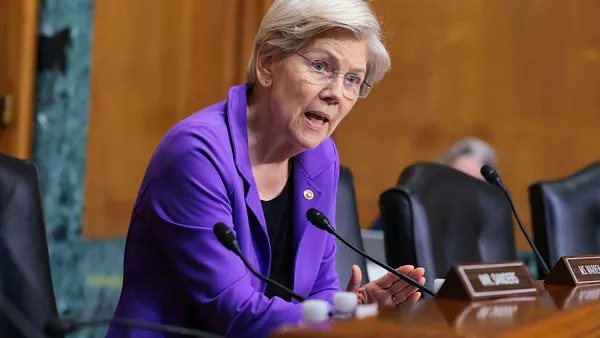Dive Brief:
- The New York State Common Retirement fund is urging Capital One shareholders to approve a proposal asking the bank to set scope 3 emissions reductions targets when it goes to a vote at the bank’s May 2 annual shareholder meeting, according to a Friday filing from the bank.
- The fund, controlled by the state comptroller’s office, initially had the proposal included on the meeting agenda Capital One submitted to the Securities and Exchange Commission last month. NYSCR also said the bank has fallen behind industry competitors on greenhouse gas emissions targets by failing to set goals targeted on reducing supply chain emissions, according to additional definitive materials Capital One filed with the agency Friday.
- The proposal is among three Capital One faces and is situated among a broader shareholder push toward greater transparency regarding the financial industry’s climate risk readiness. NYSCR said that without addressing scope 3 in its lending and investment practices, “Capital One is addressing only a fraction of its total climate risk,” according to the filing.
Dive Insight:
NYSCR said it is urging Capital One to set scope 3 targets because supply chain emissions “represent the largest source of a bank’s emissions in an area where climate risk often lies,” according to the filing. The fund said shareholders are concerned the bank could face serious business risks by financing projects or companies that are not aligned with the goal of limiting global temperature rise to 1.5 degrees Celsius.
In its filing, the state fund said it believes the request is reasonable because it narrowly covers the bank’s investment and lending activities and that implementing it would not be “unduly burdensome.”
“While Capital One’s existing targets cover all other scope 3 activities, the bank’s targets do not cover lending and investment activities,” the state retirement system said. “[This proposal] will provide investors with information that is key to fully assessing Capital One’s exposure to climate risks and the Bank’s strategies to mitigate those risks.”
The proposal also asks that the bank set near-term targets to reduce scope 3 emissions for its highest-emitting sectors in its lending and investment portfolio that have 2030 or sooner target dates. Industry peers Bank of America, Citi, JPMorgan Chase, Morgan Stanley and Wells Fargo have all set scope 3 targets for high-emitting sectors, in regards to their lending and investment portfolios, NYSCR said in the filing. The pension fund said the proposal would also not be overly prescriptive because the board would retain discretion on how and what order of priority scope 3 targets would be set.
Capital One’s board told shareholders it unanimously recommends they reject the proposal in its annual proxy materials. The bank’s board said it has already set goals to halve its scope 1 and scope 3 emissions by 2030 — compared with 2019 baselines — and source 100% renewable energy, which align with Paris Agreement targets, according to the board. Additionally, the board said it believes setting scope 3 targets that include financed emissions “would be premature and subject to significant uncertainties,” noting the SEC’s final climate disclosure rule excluded scope 3 reporting from its final mandate.
The board also said it believes the proposal “fails to take into account the complexities and uncertainties of setting emissions reduction targets that include financed emissions, and would therefore not be in the best interests of stockholders.”
NYSCR’s proposal comes amid a record year for climate-related shareholder resolutions. Environmental nonprofit Ceres found 263 climate-focused measures were filed to company boards as of March 26, which topped 2023’s record of 259. More than 80 of the resolutions are on companies’ greenhouse gas targets and transition plans, the most of any single issue, according to the report.
Among those proposals, 56 had already been withdrawn due to agreements being reached, Ceres reported at the time. Separate resolutions from the New York City Employee Retirement System to JPMorgan Chase, Citi and Royal Bank of Canada are among the tally of withdrawn proposals, after all three agreed with the city comptroller’s shareholder requests to disclose their clean energy financing ratios last month.
NYCERS will face votes on the resolution at Bank of America, Morgan Stanley and Goldman Sachs at their respective annual board meetings. Bank of America and Goldman Sachs have previously advised shareholders to oppose the motion for separate reasons. Morgan Stanley, which recently published its 2024 proxy materials, also recommends its shareholders vote against the proposal, which it believes to be “imprudent.”
In its proxy materials, Morgan Stanley said it takes issue with the lack of a standardized methodology for calculating the ratio. The bank said it also worried that making such a disclosure would imply it supports using a clean energy ratio “as a meaningful representation of [its] progress toward [its] climate goals” and the potential it could be asked to set future goals for that ratio.
“We believe that it is critical that the Company has the flexibility to engage with our clients in helping them achieve their transition plans consistent with meeting our net-zero commitment,” the company said in its proxy materials.















